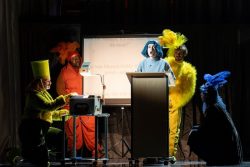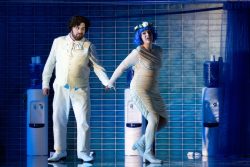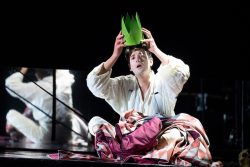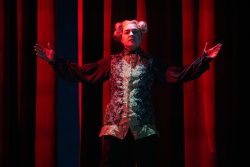 THERE are some things, like the legendary film Casablanca, that have no right to be successful. Writers brothers J and P Epstein were continually rewriting the script, sometimes delivering changes on the day of shooting. At least three different endings were envisaged, producer Jack L Warner so disliked the final iconic ending with Humphrey Bogart and Claude Rains walking off into the fog, that he tried, right up to the film’s release, to have it changed.
THERE are some things, like the legendary film Casablanca, that have no right to be successful. Writers brothers J and P Epstein were continually rewriting the script, sometimes delivering changes on the day of shooting. At least three different endings were envisaged, producer Jack L Warner so disliked the final iconic ending with Humphrey Bogart and Claude Rains walking off into the fog, that he tried, right up to the film’s release, to have it changed.
Puccini’s opera Manon Lescaut fits into this same mould. It would take the combined talents of Miss Marple, Hercule Poirot and Lord Peter Wimsey to discover who wrote the final libretto, and Puccini borrowed heavily on previously compositions to bulk out the score. Despite this the opera provided Puccini with his first big success, since 1893, when it was first performed, and it has survived dozens of different interpretations.
 With her own brand-new translation of the text, director Jude Christian takes a radical new look at Puccini’s opera, staging it in what looks like a nightmarish 1940s technicolour film, and in doing so all but succeeds in breaking that survival record. Principals and ensemble are continually battling against inappropriate costumes and sets, you expected the chorus to appear any moment with one of those famous fruit basket headdresses worn by Carmen Miranda in numerous 20th Century Fox musicals.
With her own brand-new translation of the text, director Jude Christian takes a radical new look at Puccini’s opera, staging it in what looks like a nightmarish 1940s technicolour film, and in doing so all but succeeds in breaking that survival record. Principals and ensemble are continually battling against inappropriate costumes and sets, you expected the chorus to appear any moment with one of those famous fruit basket headdresses worn by Carmen Miranda in numerous 20th Century Fox musicals.
On behalf of Manon Lescaut, soprano Jenny Stafford (who was in fine vocal form) could sue designer Charlotte Henery for breaking the Trade Descriptions Act by supplying her with just one extremely unflattering skimpy short-skirted dress and an equally unappealing blue-rinse wig, both at odds with the character. The combination did nothing to help her create the character, and made the final death scene look awkward and unreal.
 Gareth Dafydd Morris fared little better in his crumpled white suit, creating a well-drawn portrait of the faithful lover Des Grieux, but the pink suit, wide brimmed hat and handbag, worn by Edward Hawkins, underlined the evil use of the power his money brought to Manon’s misogynist protector Geronte.
Gareth Dafydd Morris fared little better in his crumpled white suit, creating a well-drawn portrait of the faithful lover Des Grieux, but the pink suit, wide brimmed hat and handbag, worn by Edward Hawkins, underlined the evil use of the power his money brought to Manon’s misogynist protector Geronte.
There were moments when Jude Christian’s libretto, in its determination to underline the bad choices forced on Manon by male dominance, appeared to be at odds with Puccini’s score, making the storyline difficult to follow.
In contrast, the WH Auden-Chester Kallman libretto for The Rake’s Progress was a delight, enhancing Stravinsky’s sharp-edged score ideally. Once again we had, under the direction of Polly Graham, a flamboyant colourfully staged production, aimed very much at attracting  a new, younger audience to opera. And in fairness, although Manon Lescaut in particular has drawn a great deal of critical flak its way, conversations with younger members of the audience and views of on-line criticism by younger groups would indicate that, albeit for a minority, the productions have found a market.
a new, younger audience to opera. And in fairness, although Manon Lescaut in particular has drawn a great deal of critical flak its way, conversations with younger members of the audience and views of on-line criticism by younger groups would indicate that, albeit for a minority, the productions have found a market.
A well balanced line up of principals – Frederick Jones as Tom Rakewell, Nazan Fikret as Anne Trulove, Jerome Knox as Nick Shadow, Lauren Young as Baba, and Amy J Payne as Mother Goose – made light work of Stravinsky’s testing score, and proved to be quite oblivious to some of the more intrusive elements in a production that, despite being the last date in an exacting 16 venue tour, showed no signs of being tired and worn at the edges.
GRP